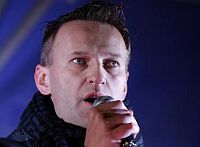Masha Gessen writes: Watching an authoritarian regime disintegrate is like watching an episode of the American television series House, MD. Someone who was enjoying an active lifestyle at the beginning of the series is experiencing multiple organ failure 15 minutes later, with the doctors frantically trying to figure out why, and which vital organ is going to go next.
A friend sent me a link to a programme broadcast on Russian national television recently (the link was to a YouTube clip, since most people I know do not have actual working television sets – the habit of watching TV has quietly died among the educated class here over the last 10 years). For over 10 minutes it made fun, crudely and openly, of Vladimir Putin’s annual televised Q&A session. “What do you make of this?” my friend wrote. “Is this fake?” It was not fake. And what I made of it is that television, the most vital of organs in a state like Russia, is failing.
NTV, the channel on which the show was broadcast, is owned by the state gas monopoly, Gazprom, which has a large press holding. Technically, the channel does not have to take orders from the Kremlin, but in the past 10 years (since it was wrested away from its founder) it just has. And now it is just going to stop.
The thing about harsh authoritarian regimes is it’s not laws, or courts, or the rigid government hierarchy that makes them run. It is fear. And once the fear is taken out of the equation – suddenly, for the vanishing of fear is always sudden – it becomes clear that these courts, laws and hierarchies do not work. Everything just starts falling apart.
That is what happened here 20 years ago: institutions just stopped taking orders from the Kremlin. The media stopped fearing the censors who still sat in their offices at every media outlet. The police stopped applying absurd regulations, enabling the birth of private enterprise. Ultimately, the heads of the Soviet Union’s 15 constituent republics lost their fear – and the empire fell apart, in what by history’s standards was the blink of an eye.
The Associated Press reports: Alexei Navalny has done more than any other opposition leader to lay the groundwork for the protest movement now challenging Prime Minister Vladimir Putin’s 12-year grip on power. His reward came last weekend when he took the stage before tens of thousands of cheering demonstrators.Alexei Navalny
Working the crowd like a firebrand preacher, Navalny had people responding to his calls with cries of “Yes” and “We are the Power!” His role now looks set only to grow.
The 35-year-old corruption-fighting lawyer and popular blogger has inspired and mobilized many in Russia’s young Internet generation, who until recently had seemed reluctant to get up from their laptops.
He reaches tens of thousands through his blog, consistently among the top three on Live Journal, and has more than 167,000 followers on Twitter.
He has tapped into deep anger throughout society, particularly over the corruption that pervades public life and the generous subsidies sent to the restive mostly Muslim regions in southern Russia. Navalny’s description of Putin’s political party as the “party of crooks and thieves” and his call to “Stop feeding the Caucasus” have become catchphrases of the opposition.
The Kremlin has woken up to the threat posed by the charismatic and ambitious Navalny, but efforts to silence him have only added to his stature.
Navalny was arrested after leading a protest march in defiance of police the day after Dec. 4 parliamentary elections. The shameless falsifications that had helped Putin’s United Russia party retain its majority outraged many Russians, and more than 5,000 joined what turned into the largest anti-Putin demonstration in years. Navalny was jailed for 15 days, but the protests only grew.
When he was released last week, Navalny said he felt that he had been “jailed in one country and freed in another.” Dozens of camera crews had waited into the early hours of the morning for his release, in a sign of his growing fame.
He was one of the most anticipated speakers at Saturday’s rally, which drew an estimated 70,000 to 100,000 people in the largest protest in the country since the demonstrations that swept away the Soviet Union two decades ago.
Reuters reports: Putin said on Wednesday that he was ready for dialogue with the opposition after the biggest protest against his 12-year rule at the weekend but added he was at a loss for a leader to hold talks with.
“The dialogue should take place,” Putin told reporters. “In what form? I will think about it. They should formulate some kind of shared platform … Who do we talk to?”



What color should the ‘Revolution’ be? Red, White and Blue would seem appropriate given the NDI and NED are ‘partners’ in this ‘Revolution’.
Not sure what is happening in Russia, but it doesn’t seem like a revolution to me. There was a Christmas Eve protest in Moscow of, let us say 150k people to be generous. There seemed to be no effort to stop it. No one was beaten to a pulp by police or plain cloth security agent. No one at the protest was arrested (to the best of my knowledge) And in the end, everyone went home. Bloggers who had been arrested were released. It doesn’t look like Tahrir Square to me. It doesn’t even look look like OWS, where thousands were arrested and several assaulted or even shot.
It looks like the kind of protests normal countries have. Russia has its problems and Putin is no prize. But revolution? I don’t think so.